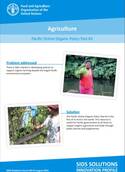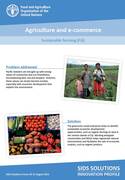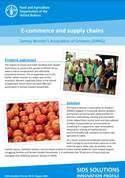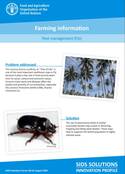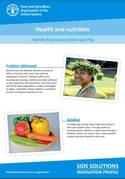SIDS Countries' Innovative Solutions
As part of the SIDS Solutions Forum (30-31 August 2021), FAO collected innovations and creative digital technologies that respond to local problems and challenges.
Read the 2-page profiles that summarize the innovative solutions on a wide variety of techniques, tools and approaches that have been generated in SIDS.
Agriculture
Pacific Online Organic Policy Tool Kit
The Pacific Online Organic Policy Tool Kit is the first of its kind in the world. It aids in the development of policies to support organic farming despite the fragile Pacific environment ecosystem.
Protected cropping system (Fiji)
Vegetable production in the Pacific Islands does not match local demand in terms of consistency in volumes and quality. Greenhouses provide controlled environmental conditions to support year-round production. A greenhouse development package supports sustainable income-generation for local farmers.
Sustainable farming (Fiji)
The grassroots social enterprise helps to identify sustainable economic development opportunities, such as organic farming on land in the remote islands of Fiji.
New taro varieties were developed to be resistant to leaf blight, appetizing, of good quality and climate ready.
Transforming agricultural value chains (Cook Islands)
In the Cook Islands, the Agritech initiative, aims to foster and adopt innovation to transform agricultural value chains by improving productivity and profitability.
Data Collection
Real-time data platform (Fiji, Palau, Papua New Guinea, Tonga)
TUPAIA is a free, open-source data platform featuring data collection, management, and mapping-led visualization tools to support health, education, and environmental projects.
E-Commerce and supply chains
Fiji has very low digital literacy, making online food delivery a challenge. This innovative response was to develop a hybrid model to assist customers with low digital literacy by complementing the online platform with a manual ordering system.
After COVID-19 closed Samoa to international visitors, taking advantage of e-commerce training and networking opportunities enabled one business owner to adapt her vanilla operation and retail shop into an online store. Her products are currently visible and available for sale to an international audience, and that has led to increased sales worldwide.
Samoa Women's Association of Growers (SWAG)
The Samoa Women's Association of Growers (SWAG) responded to the impact of COVID-19 with opportunities for business, networking, training and education.
Smallholders adapting (Cook Islands)
In response to movement restrictions due to COVID-19 that limited sales of fresh produce, a farmer decided to offer a new service to buyers by selling a basket of different types of food at a fixed price and delivering them direct to households.
Education
The absence of local higher education in Science, Technology, Engineering and Mathematics (STEM) has led to a brain drain in Aruba. SISSTEM aims to educate local and regional youth in STEM with the necessary technical skills to contribute to innovative sustainable development.
Farming Information
Agriculture, content and tools (Fiji, Papua New Guinea, Samoa, Solomon Islands)
Through a collective effort involving various stakeholders from Fiji’s agriculture industry, a platform for agriculture value chain stakeholders has been developed to connect the various actors and access information. It also offers a place to find simple digital tools for improved farm management.
The coconut, “Tree of Life,” is one of the most important traditional crops in Fiji. The use of pheromone (ethyl-4-methyl octanoate) bucket traps assists in attracting, trapping and killing adult coconut rhinoceros beetle (CRB), Oryctes rhinoceros.
Plant doctor (Fiji, Samoa, Solomon Islands, Tonga)
Farmers sometimes face considerable production losses due to pests and diseases. Treatment is possible if the pest and/or disease is properly identified. An E-platform links frontline workers in agriculture to experts and reliable resources from within the countries and worldwide through social networking to better serve farmers caring for their plants.
Plant health clinics (Fiji, Samoa, Solomon Islands, Tonga) – Pacific Community
Plant health clinics are held regularly at farmer-friendly places, markets in particular, with farmers bringing samples to assist in problem identification.
Food Processing
Hot air dryer (Solomon Islands)
This hot air dryer extends the shelf life of products from 3 days to 3 months as compared with traditional methods. It supports farmers in fulfilling their consumption needs throughout the year, producing a surplus, and selling the extra to the market. extending value chains to urban centres and between islands.
Improving local value chains (Samoa)
Many Pacific Islands suffer from an underdeveloped local economy and rely on imported food for their consumption. Developing locally processed food items has the potential to develop the market for local products such as coconuts, breadfruits, and others to offer a nutritious alternative to imported products.
Post-harvest losses, which may average 20-30% for some commodities, are considerable because of the lack of food processing units and lack of market for C grade agriculture commodities. The processing centres have improved the compliance and healthiness of the food products.
Health and nutrition
Friendly food consumption app (Fiji)
The 2015 Fiji National Nutrition Survey, showed significant levels of anemia; childhood stunting-wasting; maternal micronutrient deficiency & adult overweight or obesity. A mobile app to help Fijians take ownership of their own health status. The app works by tracking dietary intake on a daily basis through a platform called “my meals” that creates specific recipes culturally familiar to the user.
QR code contact tracing system (Cook Islands)
Cook Safe+ is the contact tracing system developed by Cook Islands based on a QR code to ensure that all visitors and residents participate in contact tracing without requiring a smart device.

